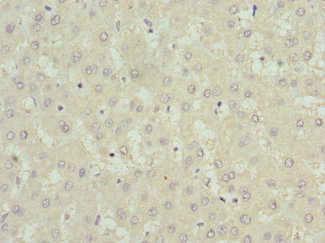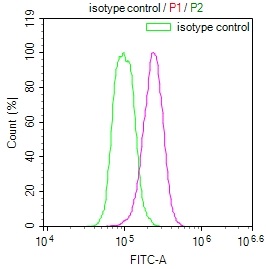USP15 Antibody
-
中文名稱:USP15兔多克隆抗體
-
貨號:CSB-PA896515DSR2HU
-
規格:¥440
-
圖片:
-
其他:
產品詳情
-
產品名稱:Rabbit anti-Homo sapiens (Human) USP15 Polyclonal antibody
-
Uniprot No.:
-
基因名:
-
別名:Deubiquitinating enzyme 15 antibody; Deubiquitinating enzyme antibody; EC 3 1 2 15 antibody; KIAA0529 antibody; MGC131982 antibody; MGC149838 antibody; MGC74854 antibody; Ubiquitin Carboxy terminal Hydrolase 15 antibody; Ubiquitin carboxyl-terminal hydrolase 15 antibody; Ubiquitin specific peptidase 15 antibody; Ubiquitin specific processing protease 15 antibody; Ubiquitin Specific Protease 15 antibody; Ubiquitin thioesterase 15 antibody; Ubiquitin thiolesterase 15 antibody; Ubiquitin-specific-processing protease 15 antibody; UBP 15 antibody; UBP15 antibody; UBP15_HUMAN antibody; Unph 2 antibody; UNPH 4 antibody; Unph-2 antibody; Unph2 antibody; Unph4 antibody; USP 15 antibody; Usp15 antibody
-
宿主:Rabbit
-
反應種屬:Human
-
免疫原:Recombinant Human Ubiquitin carboxyl-terminal hydrolase 15 protein (1-260AA)
-
免疫原種屬:Homo sapiens (Human)
-
標記方式:Non-conjugated
-
克隆類型:Polyclonal
-
抗體亞型:IgG
-
純化方式:Antigen Affinity Purified
-
濃度:It differs from different batches. Please contact us to confirm it.
-
保存緩沖液:PBS with 0.02% sodium azide, 50% glycerol, pH7.3.
-
產品提供形式:Liquid
-
應用范圍:ELISA, IHC
-
推薦稀釋比:
Application Recommended Dilution IHC 1:20-1:200 -
Protocols:
-
儲存條件:Upon receipt, store at -20°C or -80°C. Avoid repeated freeze.
-
貨期:Basically, we can dispatch the products out in 1-3 working days after receiving your orders. Delivery time maybe differs from different purchasing way or location, please kindly consult your local distributors for specific delivery time.
-
用途:For Research Use Only. Not for use in diagnostic or therapeutic procedures.
相關產品
靶點詳情
-
功能:Hydrolase that removes conjugated ubiquitin from target proteins and regulates various pathways such as the TGF-beta receptor signaling, NF-kappa-B and RNF41/NRDP1-PRKN pathways. Acts as a key regulator of TGF-beta receptor signaling pathway, but the precise mechanism is still unclear: according to a report, acts by promoting deubiquitination of monoubiquitinated R-SMADs (SMAD1, SMAD2 and/or SMAD3), thereby alleviating inhibition of R-SMADs and promoting activation of TGF-beta target genes. According to another reports, regulates the TGF-beta receptor signaling pathway by mediating deubiquitination and stabilization of TGFBR1, leading to an enhanced TGF-beta signal. Able to mediate deubiquitination of monoubiquitinated substrates, 'Lys-27'-, 'Lys-48'- and 'Lys-63'-linked polyubiquitin chains. May also regulate gene expression and/or DNA repair through the deubiquitination of histone H2B. Acts as an inhibitor of mitophagy by counteracting the action of parkin (PRKN): hydrolyzes cleavage of 'Lys-48'- and 'Lys-63'-linked polyubiquitin chains attached by parkin on target proteins such as MFN2, thereby reducing parkin's ability to drive mitophagy. Acts as an associated component of COP9 signalosome complex (CSN) and regulates different pathways via this association: regulates NF-kappa-B by mediating deubiquitination of NFKBIA and deubiquitinates substrates bound to VCP. Involved in endosome organization by mediating deubiquitination of SQSTM1: ubiquitinated SQSTM1 forms a molecular bridge that restrains cognate vesicles in the perinuclear region and its deubiquitination releases target vesicles for fast transport into the cell periphery. Acts as a negative regulator of antifungal immunity by mediating 'Lys-27'-linked deubiquitination of CARD9, thereby inactivating CARD9.; (Microbial infection) Protects APC and human papillomavirus type 16 protein E6 against degradation via the ubiquitin proteasome pathway.
-
基因功能參考文獻:
- a USP15-dependent lysosomal pathway controls p53-R175H turnover in ovarian cancer cells PMID: 29593334
- USP15 could increase the level of HPV16 E6 by inhibiting E6 degradation. PMID: 29895155
- Data indicate that mysterin/RNF213 is a substrate of ubiquitin specific protease 15 (USP15), and that the conserved skipping of exon 7 significantly decreases its specific affinity for mysterin. PMID: 28276505
- Deubiquitylation of hepatitis B virus X protein (HBx) by ubiquitin-specific peptidase 15 (USP15) increases HBx stability and its transactivation activity. These results suggest that USP15 plays an essential role in stabilizing HBx and subsequently affects the biological function of HBx. PMID: 28074857
- HPV E6 oncoprotein antagonizes the activation of the cytoplasmic innate immune sensor RIG-I by targeting its upstream regulatory enzymes TRIM25 and USP15. We further show that the RIG-I signaling cascade is important for an antiviral innate immune response to HPV16 infection PMID: 29263274
- these data indicate that Nef and USP15 are vital in regulating degradation of viral and cellular proteins and thus HIV-1 replication, and specific degradation of viral, not cellular proteins. PMID: 27460547
- We show that PRP31, a component of U4 snRNP, is modified with K63-linked ubiquitin chains by the PRP19 complex and deubiquitinated by USP15 and its substrate targeting factor SART3. USP15SART3 makes a complex with USP4 and this ternary complex serves as a platform to deubiquitinate PRP31 and PRP3 PMID: 28088760
- TGF-b promotes the translation of USP15 through activation of mammalian target of rapamycin by the phosphoinositide 3-kinase/AKT pathway. Upregulation of USP15 translation links the crosstalk between TGF-beta signaling and p53 stability, allowing this cytokine to have a critical role in cancer progression. PMID: 27893708
- We concluded that USP15 attenuates IGF-I signaling by antagonizing Nedd4-induced IRS-2 ubiquitination. PMID: 28126338
- These results uncover a new regulatory mechanism that USP15 activates Nrf1 against the beta-TrCP inhibition to maintain proteostasis. PMID: 27416755
- Study identified USP15 as having recurrent de novo loss of function mutations and discovered evidence supporting two other known genes with recurrent de novo variants (FOXP1 and KDM5B). PMID: 28344757
- crystal structures of SART3 in the apo-form and in complex with the DUSP-UBL domain of USP15 at 2.0 and 3.0 A, respectively. Structural analysis reveals SART3 contains 12 half-a-tetratricopeptide (HAT) repeats, organized into two subdomains, HAT-N and HAT-C. SART3 dimerizes through the concave surface of HAT-C, whereas the HAT-C convex surface binds USP15 in a novel bipartite mode. PMID: 27255711
- SMURF2 is a critical target of USP15 in the TGF-beta signaling pathway. PMID: 26435193
- our data demonstrate that USP15 acts as a negative regulator of RIG-I signaling via DUB-dependent and independent mechanisms. PMID: 26061460
- These data identify USP15 as an antagonist of Parkin and suggest that USP15 inhibition could be a therapeutic strategy for PD cases caused by reduced Parkin levels. PMID: 24852371
- Data show that USP15 enhances BMP-induced phosphorylation of SMAD1 by interacting with and deubiquitylating ALK3. PMID: 24850914
- Data suggest that ubiquitin specific peptidase 15 (USP15) may play a role in the pathogenesis of psoriasis through regulating the type I TGFbeta receptor (TbetaR-I)/Smad7 pathway. PMID: 24939309
- Data indicate ubiquitin-specific protease 15 (USP15) as a critical regulator of the tripartite motif protein 25 (TRIM25)- and RNA sensor retinoic acid-inducible gene-I (RIG-I)-mediated antiviral immune response. PMID: 24399297
- USP15 deficiency promoted T cell activation in vitro and enhanced T cell responses to bacterial infection and tumor challenge in vivo. PMID: 24777531
- SART3 recruits ubH2B, which may be evicted from DNA during transcription, for deubiquitination by Usp15 PMID: 24526689
- The deubiquitylase USP15 stabilizes newly synthesized REST and rescues its expression at mitotic exit. PMID: 23708518
- USP15 specifically deubiquitinates Keap1, which suppresses the Nrf2 pathway. PMID: 23727018
- The dominant effect of prolonged USP15 depletion upon signal amplitude is due to a decrease in CRAF levels while allowing for the possibility that USP15 may also function to dampen MAPK signaling through direct stabilization of BRAP. PMID: 23105109
- Our results show that USP15 regulates the TGF-beta pathway and is a key factor in glioblastoma pathogenesis PMID: 22344298
- USP15 is critical for the occupancy of endogenous target promoters by the SMAD complex. PMID: 21947082
- structure of the double domain from USP15 PMID: 22001210
- A 1.5 A resolution crystal structure of the human USP15 N-terminal domain revealed a 80 A elongated arrangement with the domains aligned in tandem. PMID: 21848306
- These results indicate that USP15 is involved in the regulation of hypertrophic responses in cardiac muscle through transcriptional and post-translational modulation of SLIM1. PMID: 21219870
- A functional Zn finger of USP15 is needed to maintain a conformation essential for disassembling poly-Ub chains, a prerequisite for rescuing the E3 ligase Rbx1. PMID: 16005295
- analysis of the human ubiquitin-specific protease 15 DUSP domain PMID: 16298993
- These results implicate USP15 directly in the regulation of E6 protein stability and suggest that ubiquitylated E6 could be a substrate for USP15 ubiquitin peptidase activity. PMID: 19553310
- Results suggest a role of COP9 signalosome (CSN)-mediated deneddylation in the formation of the beta-catenin-degrading supercomplex and the protection of complex-bound adenomatous polyposis coli via CSN-associated USP15. PMID: 19576224
顯示更多
收起更多
-
亞細胞定位:Cytoplasm. Nucleus. Mitochondrion.
-
蛋白家族:Peptidase C19 family
-
組織特異性:Expressed in skeletal muscle, kidney, heart, placenta, liver, thymus, lung, and ovary, with little or no expression in other tissues.
-
數據庫鏈接:
Most popular with customers
-
-
YWHAB Recombinant Monoclonal Antibody
Applications: ELISA, WB, IHC, IF, FC
Species Reactivity: Human, Mouse, Rat
-
Phospho-YAP1 (S127) Recombinant Monoclonal Antibody
Applications: ELISA, WB, IHC
Species Reactivity: Human
-
-
-
-
-




















